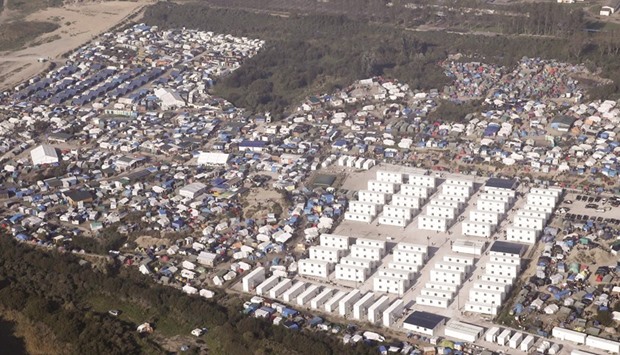On the eve of the demolition of the Calais “Jungle” camp, French officials handed out flyers in several languages notifying migrants of the camp’s imminent closure and urging them to abandon their dreams of reaching Britain.
Less than 24 hours before the operation to raze the squalid settlement near Calais port was due to start some migrants, however, were still clinging to hopes of a new life across the Channel.
“We have yet to convince some people to accept accommodation and give up their dream of Britain. That’s the hardest part,” Didier Leschi, head of the French immigration office OFII told AFP.
Some Afghans have vowed not to budge – or to make their own way back to Calais from the regional shelter to which they are sent.
“They’ll have to force us to leave. We want to go to Britain,” Karhazi, an Afghan, said.
Others welcomed the move.
“You never know. The demolition may ultimately be a good thing,” said Faisal al-Ajab, a 39-year-old Sudanese man, who has already applied for asylum in France and was living in the Jungle while waiting for housing.
“The officials say tomorrow is the beginning of something better. Let’s hope this is true,” Ajab, who used to make his living as an interior decorator, said as he trimmed his friend’s beard for the move.
The camp’s demolition and the resettlement of its estimated 6,000-8,000 residents in refugee shelters around the country is due to get underway this morning.
Hammoudi, a 22-year-old from Aleppo, Syria, told AFP that despite a semblance of normality in parts of the camp, “everyone knows it’s over”.
“Today is the last day of the Jungle,” he said.
Officials and aid workers distributed the flyers yesterday instructing migrants in text and pictures to show up at a hangar near the camp from 8am (0600 GMT) with their luggage.
From there the migrants – mostly Afghans, Sudanese and Eritrean males – will be taken by bus to temporary shelters, where they can seek asylum.
Some 145 buses will be deployed over the course of the three-day move.
But most of the migrants who travelled thousands of miles to Calais did so in the hope of stowing away on a lorry heading to Britain, where they have contacts and believe their job prospects are better.
Pascal Brice, head of the Ofpra asylum agency, said his staff were trying to convince migrants that Calais was a “dead end” and that their asylum requests in France would be processed “very quickly”.
Around 70% of migrants evicted from other camps in Calais in the past had been given French residency, he said.

An aerial view shows white containers, tents and makeshift shelters on the eve of the evacuation and dismantlement of the ‘Jungle’ migrant camp in Calais.
